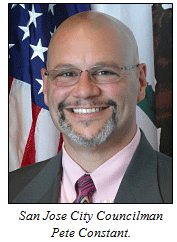Is there a right to be hired? That’s what the 214-member Confidential Employees Organization, a public sector union representing employees of the San Jose City Council, seem to think. Controversy erupted when City Councilman Pete Constant wanted to save the city, which currently faces a $100 million budget deficit, $70,000 annually by not hiring an assistant.
But, instead of being praised for his fiscal discipline, the city’s only-serving Republican was met with a lawsuit by the union. The union says he is required under the city’s collective bargaining agreement to hire the assistant, whether he wants one or not. Constant has said he prefers to the handle the secretarial duties himself with the help of his aides, and that his constituents support him making the decision of who to hire, if anyone.
Judge Kevin McKenney of the Santa Clara County Superior Court has ordered that the case be decided by California’s Public Employment Relations Board.
Constant is hoping the board will rule in his favor. “My concern quite frankly is not who decides the issues. It’s getting a resolution on the core issue, which is: Who should determine how I staff my office?” Constant explained. An eminently reasonable question coming from what is supposed to be one of the city’s top-ranking officials.
According to Mercury News, the union agrees that the city is powerless to anything other than follow the labor agreements. “LaVerne Washington, president of the employees’ association, said it is not Constant’s prerogative to create his own ‘process and procedures,’ which she said conflict with labor agreements between the city and the union.”
Washington elaborated, saying, “This was a process the city designed well before Pete Constant got there.”
Constant’s struggle just to make his own staffing decisions highlights the inherent defects of collective bargaining for public sector unions. By agreeing to up-front costs in the budget via those arrangements, municipalities and states have created hundreds of billions of dollars of taxpayer liabilities. As a result, those arrangements are shaping public policy decisions large and small, and mean that before legislators ever convene to make a budget, most of the revenues are already accounted for.
In the slow economy, with tax collections remaining low, legislators now are powerless to rein in those obligations specified by the collective bargaining agreements, which guarantee substantial pay and benefits higher than their private sector counterparts — and apparently even the right to be hired. The only solution is to revisit those agreements, which is exactly what Republicans in Wisconsin have proposed doing.
Mish’s Global Economic Trend Analysis blog comments on the controversy, saying the union’s reaction to Constant “is just the kind of thing that gets the public riled up against public unions,” adding, “It will backfire.” The author, Mike “Mish” Shedlock, is right.
This particular case in San Jose a teachable moment for the public, who are once again being reminded of how much has been given away to public employees. The blog explained, “union rights to ‘organize’ must stop at the point when they tread on the rights of others to pursue employment, to do whatever they want with their own time, and to not waste money hiring employees they do not need.”
In addition, public sector unions regularly wield their political clout to defend the collective bargaining agreements at all costs, pressuring legislators from doing anything that would reduce the considerable benefits, and raising millions of dollars to elect pro-union elected officials.
That is why the Wall Street Journal’s James Taranto writes, “Collective bargaining in the public sector thus is less a negotiation than a conspiracy to steal money from taxpayers,” since the primary stakeholder — the public — has absolutely no say in how their own tax dollars are spent. And that is the injustice Councilman Pete Constant and Wisconsin Governor Scott Walker are fighting to remedy.
Robert Romano is the Senior Editor of Americans for Limited Government.


